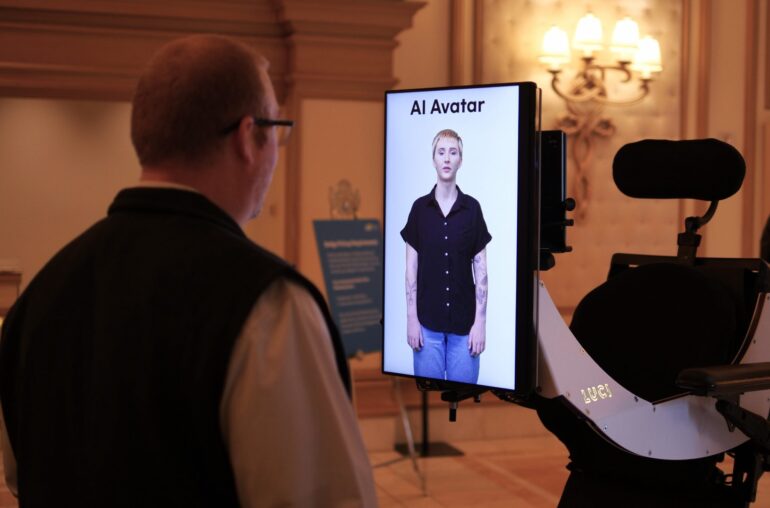TL;DR:
- Lenovo and DeepBrain AI collaborate with the Scott-Morgan Foundation to introduce an AI-powered avatar platform.
- The platform assists individuals with ALS, enabling communication as the disease progresses.
- Unveiled at CES 2024, the lifelike avatars offer a lifeline for ALS patients.
- Lenovo’s predictive typing tech aims to aid communication when traditional methods fail.
- The project signifies the potential of AI in breaking through disabilities for a more inclusive future.
- ALS patient Erin Taylor’s avatar, with 96% accuracy, highlights the platform’s promise.
- The Scott-Morgan Foundation’s commitment to technology-driven inclusivity fuels this innovation.
Main AI News:
In a groundbreaking collaboration between tech giants Lenovo and DeepBrain AI, along with the Scott-Morgan Foundation, a nonprofit dedicated to assistive technologies, a pioneering AI-powered avatar platform has been unveiled. This transformative technology is designed to provide a lifeline for individuals grappling with amyotrophic lateral sclerosis (ALS), especially as the disease progresses to the point where speech and mobility become incredibly challenging or even impossible.
At CES 2024, a premier tech showcase held in Las Vegas from January 9th to 12th, the world got a glimpse of this remarkable AI-powered platform. Scott Tease, Vice President, and General Manager of High-Performance Computing and AI at Lenovo, expressed his enthusiasm, stating, “This is a fantastic example of the untapped potential of generative AI to empower individuals and build a more inclusive future.”
The CEO of the Scott-Morgan Foundation, Andrew Morgan, shared his vision: “Our commitment is to ensure a universal right to thrive through technology.” He emphasized that AI was driving the work they began years ago and lauded their collaborators for transforming accessibility not only for ALS patients but for all.
This innovative assistive technology platform aims to provide crucial support to individuals grappling with severe diseases like ALS. ALS is characterized by the progressive degeneration of nerve cells responsible for voluntary movement, ultimately leading to paralysis. This debilitating condition can render communication extremely challenging.
DeepBrain AI has been at the forefront of developing AI-based avatars and lifelike video representations of individuals. In collaboration with the Scott-Morgan Foundation, Lenovo led efforts to adapt this technology to assist individuals with ALS and other diseases in maintaining their communication abilities, even when their own bodies no longer cooperate.
Scott Tease underscored Lenovo’s commitment to pushing boundaries, stating, “Leveraging our expansive solutions portfolio and in-house expertise, we love finding these opportunities to reimagine what’s possible and help solve humanity’s greatest challenges.“
Eric Jang, CEO of DeepBrain AI, expressed his company’s goal of enabling hyper-realistic avatars for everyone through AI-powered technology. He praised Lenovo for its visionary approach to implementing this technology as a component of an assistive technology platform.
As a proof-of-concept, Erin Taylor, a 24-year-old woman diagnosed with ALS last year, underwent full-body video capture at a studio. Her avatar, boasting an astonishing 96% true-to-life accuracy, was unveiled at CES 2024.
Taylor, who resides in California, was pursuing a career in botany and forestry when she experienced a sudden onset of symptoms leading to her diagnosis. She expressed her gratitude to the Scott-Morgan Foundation for inviting her to contribute to shaping the future through this groundbreaking technology.
Lenovo has also leveraged AI to develop predictive typing technology, aiming to simplify the communication process for individuals with ALS and other motor-limiting conditions when traditional keyboards or voice-to-speech options are no longer viable.
Researchers are diligently working to integrate this predictive system with the avatar and an eye-tracking keyboard, with the ultimate goal of allowing individuals with conditions like ALS to be fully seen and heard in the digital realm.
Andrew Morgan, CEO of the Scott-Morgan Foundation, expressed his confidence in the project’s potential, stating, “I have no doubt this pioneering proof of concept will one day help shape even more staggering innovations.” He added, “Our foundation was built on the dream that technology, and AI especially, can break through severe disabilities and ensure a right to create, connect, and live life joyfully. We’re making that happen.”
For Erin Taylor, the avatar represents not just a technological marvel but also a beacon of hope. She emphasized, “The avatar is incredible, but what matters most to me is that this technology could help change the lives of many more people facing ALS or other diseases—a way of showing how bright the future can still be.”
Conclusion:
This groundbreaking AI avatar platform demonstrates the immense potential of AI in the healthcare and assistive technology market. It addresses a critical need for ALS patients, providing a powerful tool for communication and fostering inclusivity. This innovation, combined with Lenovo’s predictive typing technology, signifies a step towards revolutionizing accessibility for individuals with motor-limiting conditions. The collaboration between tech leaders and nonprofits showcases the growing importance of AI in enhancing the quality of life for those facing debilitating diseases, setting a precedent for future innovations in the market.

